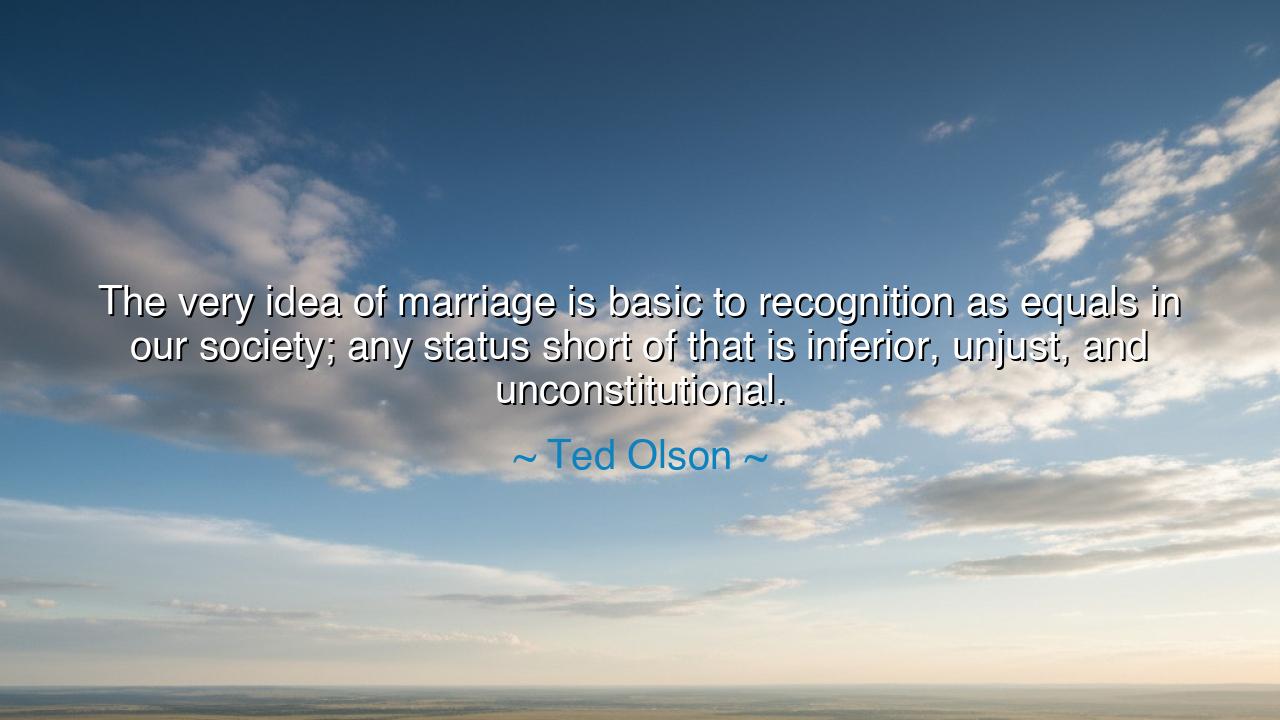
The very idea of marriage is basic to recognition as equals in
The very idea of marriage is basic to recognition as equals in our society; any status short of that is inferior, unjust, and unconstitutional.






When Ted Olson declared, “The very idea of marriage is basic to recognition as equals in our society; any status short of that is inferior, unjust, and unconstitutional,” he was not merely arguing a case before the court — he was speaking to the conscience of a nation. His words were born from a struggle that reached beyond law and politics, into the deepest chambers of the human heart. In them, we hear the eternal call for equality, the cry of every soul that has ever been denied its right to love openly, and to be seen as whole in the eyes of society. Olson, a man who once stood on the conservative side of America’s political divide, became an unlikely champion of marriage equality, and through his transformation, he revealed a universal truth: that justice is not bound by ideology, but by the recognition of human dignity.
The origin of Olson’s words lies in the great legal battle over same-sex marriage in the United States. Alongside David Boies — the man who had once been his opponent in the Bush v. Gore case — Olson co-led the challenge against California’s Proposition 8, a law that sought to ban marriage between same-sex couples. For Olson, the issue was not political but constitutional. He argued that to deny marriage to any couple was to deny them equal standing as citizens, to relegate their love to something less — a condition of inferiority dressed in the guise of tradition. And in the quiet strength of his reasoning, one could hear the echo of the ancients: that law, when it does not serve justice, ceases to be law at all.
In speaking of marriage as basic to recognition as equals, Olson touched upon one of civilization’s oldest institutions. Across time, marriage has been both sacred bond and social contract — a joining not only of hearts but of rights, families, and destinies. To be permitted marriage has always meant to be seen by society, to be counted among the honored and the legitimate. When a group is barred from this union, it is not love alone that is denied them — it is citizenship, belonging, and respect. Thus, Olson’s words cut to the root of the matter: to deny marriage to some is to deny equality to all, for justice divided is justice destroyed.
History offers countless mirrors to this truth. When Loving v. Virginia was decided in 1967, striking down laws that forbade interracial marriage, the same arguments were raised — that tradition must be protected, that change would erode society. Yet time revealed those fears to be hollow. In the faces of Mildred and Richard Loving, the couple whose quiet courage changed the law, one could see the same spirit that Olson defended decades later: the belief that love knows no boundary that law or prejudice can rightfully impose. Just as their victory restored dignity to countless families, Olson’s fight for same-sex marriage would one day restore dignity to millions more.
Olson’s insight also carries the wisdom of restraint — a warning that status short of equality is never enough. Throughout history, oppressors have offered half-freedoms, hoping that the oppressed would be content with lesser recognition. But as the ancients taught, a shadow of liberty is no liberty at all. To call love by any name but marriage is to reduce it to a tolerated exception rather than an equal expression of humanity. It is to say, “You may live as we do, but you are not as we are.” And such distinctions, however gently spoken, are injustices woven into the fabric of law.
In his declaration that such inequality is unconstitutional, Olson reawakened the sacred purpose of the law itself. For the Constitution, in its truest spirit, is not a document of restraint, but of protection — a shield for those who have no power, a promise that all are created equal before the law. When law forgets this, it becomes tyranny dressed in parchment. Olson’s argument, therefore, was not an appeal to sentiment but to the soul of the republic: that America must either extend the blessings of liberty to all its people, or confess that its founding promise was a lie.
And so, let the lesson endure: that equality is the foundation of love, and love the foundation of civilization. When we deny one, we erode the other. Let every generation remember that the measure of a people is found not in how they honor the powerful, but in how they honor those once excluded. To love freely, to marry openly, to walk in dignity beside one’s beloved — these are not privileges; they are rights written in the language of the heart and confirmed by the law of heaven. The wise must therefore guard them fiercely, for as Ted Olson showed, to defend love is to defend humanity itself.






AAdministratorAdministrator
Welcome, honored guests. Please leave a comment, we will respond soon